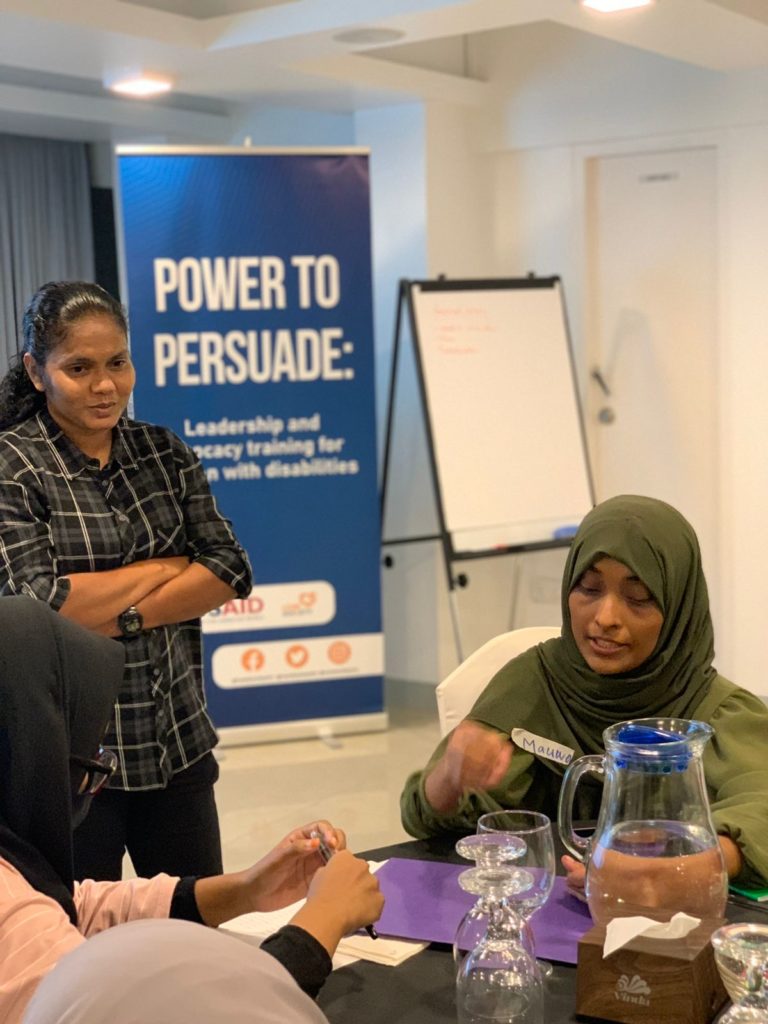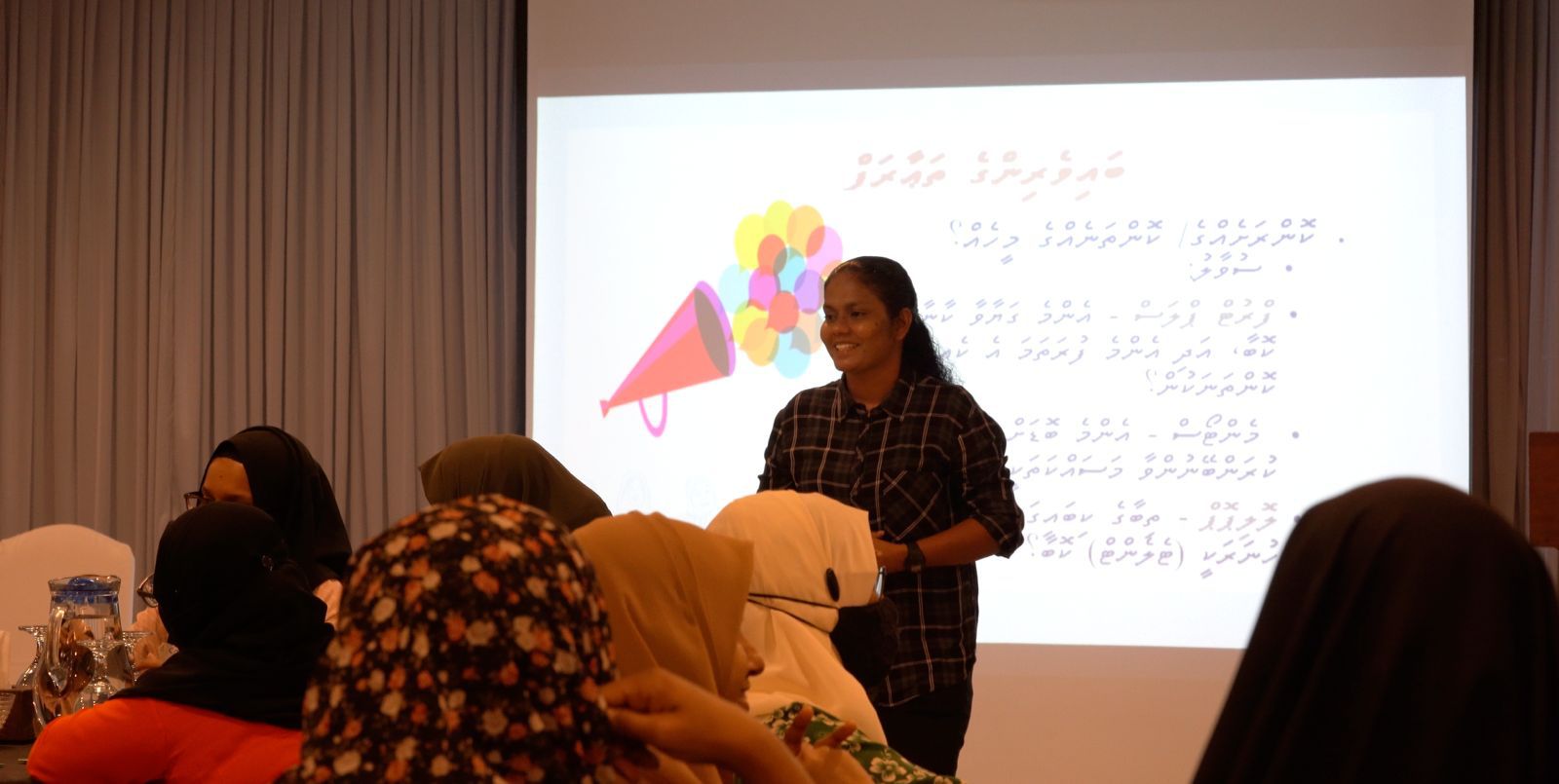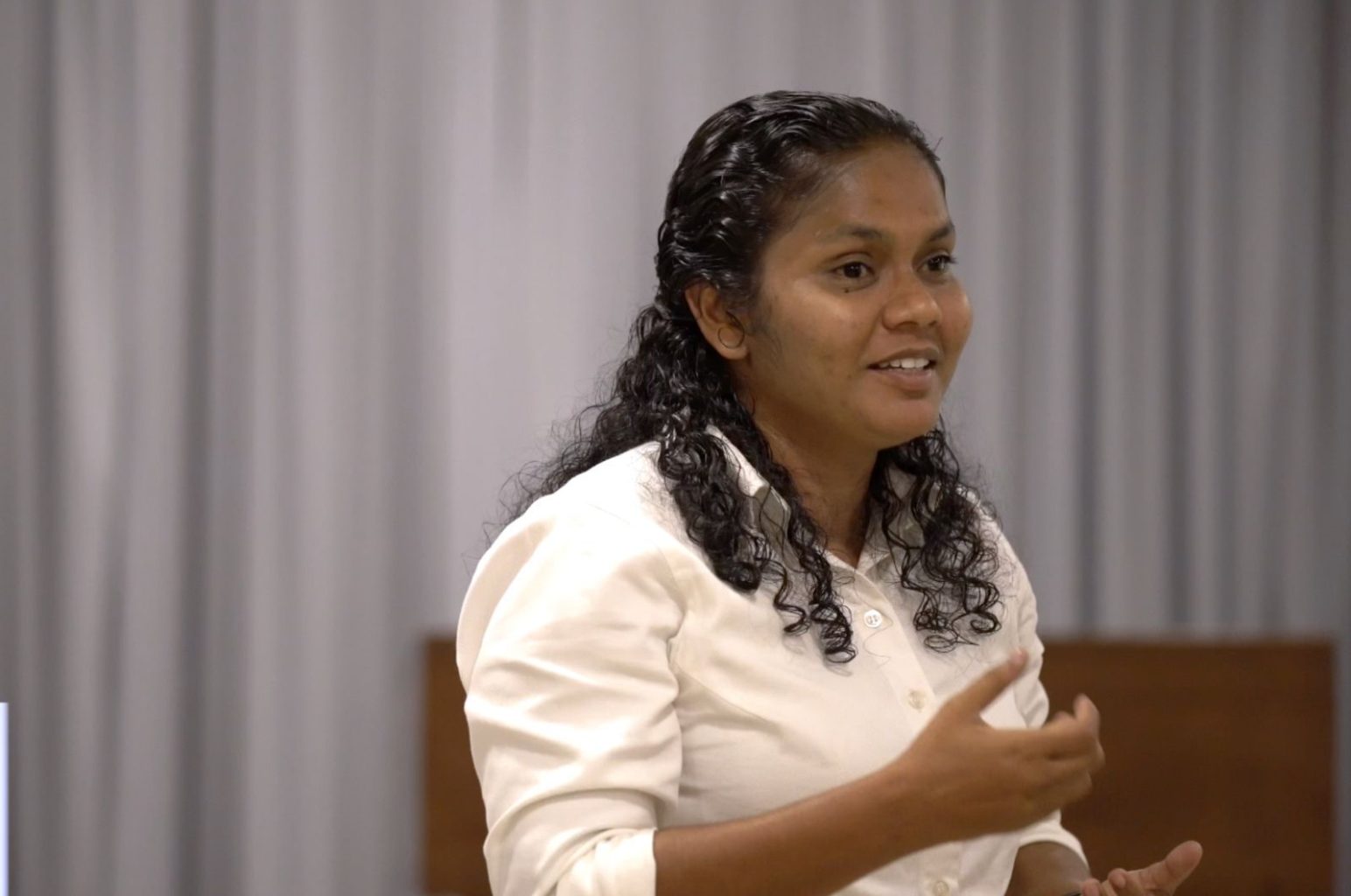Throughout the month of March, CEPPS will be sharing profiles of women leading the way for greater inclusion of the voices and priorities of women with disabilities. In collaboration with local civil society organization Care Society, CEPPS/IFES has been implementing the Power to Persuade Program in the Maldives, strengthening the capacity of women with disabilities to advocate for their priorities in Maldivian policy- and decision-making processes.
Fathimath Ibrahim, an elected member of the Maldives Disability Council and a Customer Relation Officer with the Maldives Tourism Development Corporation, attended the “Power to Persuade” Training of Trainers (ToT) session and co-facilitated “Power to Persuade” leadership and advocacy trainings in Male’ and Haa Dhaal Atoll.

“My main aim in life is to reduce the challenges faced by people with disabilities by giving them accessibility, to fight for gender equality and women’s rights. I want to prove to people that being a blind person does not stop you from achieving great things in life.”
In your view, what are the biggest obstacles facing people with disabilities in the Maldives?
Access is a big issue in the Maldives. A lot of the things that people take for granted in their everyday life is inaccessible for persons with disabilities living in the Maldives. This includes very simple tasks like walking on the street, doing your shopping, going to the hospital, or even withdrawing money from your account. Since the environment doesn’t cater to their needs, persons with disabilities often feel excluded and not part of the community.
In terms of employment, while there seems to be an effort towards including persons with disabilities in formal work environments, they are often relegated very menial tasks that do not reflect their true skills or capabilities.
All of this comes down to two factors: lack of public awareness on disability issues, and lack of involvement of persons with disabilities in making decisions.
What do you think are priority issues for women with disabilities?
When compared to men with disabilities, women with disabilities face even more barriers to be included in the community. Culturally, any harm that a girl or women with disabilities might incur from outside their home is seen as sign of shame for entire family. But this is not the case for men or boys, so they are able to be more involved in the society.
For instance, in the Maldives we have to rely on speedboats or ferries to travel between islands to access services. And these facilities are often not physically accessible independently. It is usually a man who will have to physically lift or assist a woman with disabilities to embark and disembark, and the families are often not comfortable with this. And this is one factor that really hinders travel of women with disabilities between islands. Sometimes they will miss out on important opportunities such as trainings.
Women with disabilities also have to have access to employment opportunities in order to have the ability to escape from harmful situations at home, for example domestic abuse. But usually they are only trained in very gendered activities such as sewing or cake making courses and not prepared for a professional work environment. The few employment opportunities are also categorized and linked to very specific qualifications such as the completion of university degrees etc. In a country where there are many barriers to accessing education for persons with disabilities, this puts them at a serious disadvantage. This needs to be changed.
 Why did you attend the Power to Persuade (P2P) training?
Why did you attend the Power to Persuade (P2P) training?
As a blind person, I wanted to prove that a person with disabilities has the capacity to inform and change the thinking of the society regarding our capabilities. That is why I became a trainer in this program.
It is also important for disability issues to be advocated for by persons with disabilities who face these challenges every day. It is easier for a person with disability to listen, agree and become motivated to act when they are being informed by a person with disability. For a lot of the participants in the training, it was their first time at a training, and the first time they held a microphone and spoke to a group of people. But when they saw someone who faces their exact challenges do it in front of them, they were motivated to do it themselves.
I also like the fact that the program bears a very strong focus on women with disabilities, as disability issues are also represented mostly by men with disabilities.
What did you learn or take away from the P2P training?
I have been an advocate for the rights of persons with disabilities for a long time. But I was mostly working with the blind and visually impaired community.
It was very interesting to interact and hear about the challenges faced by the deaf or hearing-impaired community. Especially in smaller islands with smaller populations where deaf or hearing-impaired persons do not have access to sign language education or have the opportunity to interact with other members of the hearing-impaired community, they are very isolated. I have met women who have not been able to communicate with anyone for years because they were not taught how to sign. I find myself thinking all the time about what can be done regarding that.
 How will you use (or how have you used) what you learned during the training to advocate for women with disabilities in the Maldives?
How will you use (or how have you used) what you learned during the training to advocate for women with disabilities in the Maldives?
I was always an advocate on these issues, so I was familiar with a lot of the concepts surrounding advocacy. But I learned ways to improve our advocacy tactics, and we used them when we later went on to advocate for issues we had identified in the trainings. When we wanted to address barriers to physical mobility in the Male’ city for instance, we realized our case would be stronger if we established links with other likeminded NGOs and brought them into our advocacy meetings.
What are your hopes for women in the Maldives?
I want women to be able to access opportunities without any discrimination obstacles. And I want society to change their thinking around the capability of women. I want women’s voices to be included in all decisions. Especially for women with disabilities, I have seen many with the skills and passion to become strong leaders. I want to see a woman with disabilities in the local government as an island councilor or a member of the island women’s development committee. I want to see them take on technically skilled challenging jobs instead of menial tasks and employed in a superficial manner.